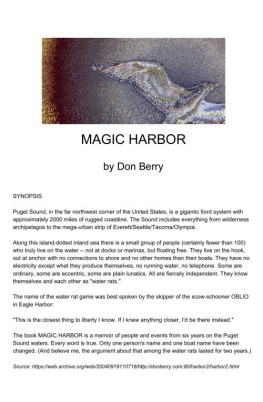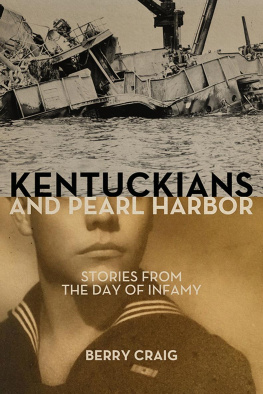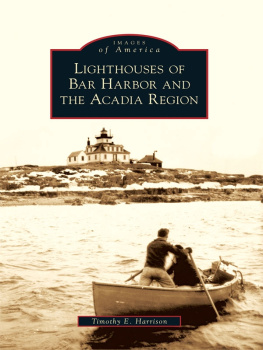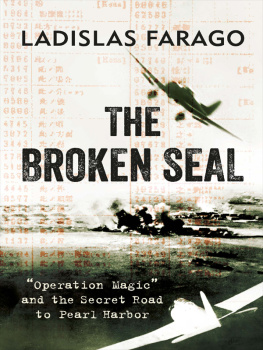Don Berry - Magic Harbor
Here you can read online Don Berry - Magic Harbor full text of the book (entire story) in english for free. Download pdf and epub, get meaning, cover and reviews about this ebook. year: 1995, genre: Detective and thriller. Description of the work, (preface) as well as reviews are available. Best literature library LitArk.com created for fans of good reading and offers a wide selection of genres:
Romance novel
Science fiction
Adventure
Detective
Science
History
Home and family
Prose
Art
Politics
Computer
Non-fiction
Religion
Business
Children
Humor
Choose a favorite category and find really read worthwhile books. Enjoy immersion in the world of imagination, feel the emotions of the characters or learn something new for yourself, make an fascinating discovery.
- Book:Magic Harbor
- Author:
- Genre:
- Year:1995
- Rating:4 / 5
- Favourites:Add to favourites
- Your mark:
- 80
- 1
- 2
- 3
- 4
- 5
Magic Harbor: summary, description and annotation
We offer to read an annotation, description, summary or preface (depends on what the author of the book "Magic Harbor" wrote himself). If you haven't found the necessary information about the book — write in the comments, we will try to find it.
Magic Harbor — read online for free the complete book (whole text) full work
Below is the text of the book, divided by pages. System saving the place of the last page read, allows you to conveniently read the book "Magic Harbor" online for free, without having to search again every time where you left off. Put a bookmark, and you can go to the page where you finished reading at any time.
Font size:
Interval:
Bookmark:

MAGIC HARBOR
by Don Berry
Puget Sound, in the far northwest corner of the United States, is a gigantic fiord system with approximately 2000 miles of rugged coastline. The Sound includes everything from wilderness archipelagos to the mega-urban strip of Everett/Seattle/Tacoma/Olympia.
Along this island-dotted inland sea there is a small group of people (certainly fewer than 100) who truly live on the water -- not at docks or marinas, but floating free. They live on the hook, out at anchor with no connections to shore and no other homes than their boats. They have no electricity except what they produce themselves, no running water, no telephone. Some are ordinary, some are eccentric, some are plain lunatics. all are fiercely independent. They know themselves and each other as "water rats."
The name of the water rat game was best spoken by the skipper of the scow-schooner OBLIO in Eagle Harbor:
"This is the closest thing to liberty I know. If I knew anything closer, I'd be there instead."
The book MAGIC HARBOR is a memoir of people and events from six years on the Puget Sound waters. Every word is true. Only one person's name and one boat name have been changed. (And believe me, the argument about that among the water rats lasted for two years.)
Source: https://web.archive.org/web/20040919110718/http://donberry.com:80/harbor2/harbor2.html
At different times in my life I have had the privilege of some of the great harbors of the world: English Harbor in Antigua, the sweet arc of the Anse Mitan in Martinique, Auckland harbor in New Zealand, Quartermaster Harbor on Vashon Island. But in my mind, the jewel among these is the island harbor in Puget Sound where I now live.
Puget Sound is unique among the world's waters, a great canyon of ocean a hundred miles long and ten miles wide, cut into the continent millennia ago by the grinding of glacial ice. As the glacier withdrew, allowing the ocean to pour in, it carved out dozens of inlets, bays, coves and harbors in bewildering profusion, dotting the water with hundreds of islands, some in paradisiacal archipelagos like the San Juans, others in relative isolation like Vashon and Bainbridge and Whidby. all told, there are over two thousand miles of coastline in the Sound.
Thousands of vessels traverse this inland sea every day; it is a strangely urban world. Boats range from leaky plywood dinghies through racing yachts to the gigantic container ships like great seaborne dinosaurs making their ponderous way down the shipping channel. And crossing back and forth dozens of times a day, the ubiquitous white ferries with up to three hundred automobiles aboard.
Among the hundreds of thousands of people who travel the waters of the Sound every day, there is a tiny, virtually invisible community of water people who do not consider the land their home. They do not tie to docks or wharves, nor fit neatly into marina slips. They ride free at anchor; they live on the hook.
In all of Puget Sound, along the two thousand mile twists and turns of shoreline, the number of people living on the hook is probably no more than sixty or seventy; certainly fewer than a hundred. Universally, they know themselves, and each other, as water rats. The water rat's world is a tiny planet, a micro-universe of wind and water, statistically not worthy of anyone's notice.
Living on the hook is very different from, say, living on a boat at a marina. The water rats have, by choice, given up the support systems the landbound, and the dockbound, take for granted. They are not connected to electricity, to heat, to telephones, to running water, to any of the umbilicals of organized society. They live beyond the edge where the dominant culture stops. It is a life that can only be chosen intentionally, because the requirements are unyielding; you either take full responsibility for your own life, or you go under.
For the water rat, a safe harbor is the most precious of the jewels of the sea. It is the physical equivalent of that still, safe place in the center of every being, the place of ultimate refuge that is sought through meditation or science or art or philosophy; protection from the storms that assail us all.
I know of no safer harbor anywhere than Eagle Harbor. It lies on an island, eight miles across Puget Sound from the metropolitan skyline of Seattle. The dogleg channel into the mouth of the harbor requires four changes of course; and the harbor itself zig-zags through another three turns, extending two miles back into the body of the island. No harbor is better protected against the prevailing winds; the holding ground for the anchor is reliable; there is easy access landside for supplies.
But these are only the physical elements of this safe place, easy to describe. There is another aspect, known to us all, but not easy to define, and impossible to explain. Those who know this harbor best sometimes use the word "magic." And magic, to the water people, means that which protects us from harm.
In this harbor, as in all harbors, vessels sometimes drag anchor in storms -- but here, rather than colliding, or going disastrously aground on the lee shore, they seem to avoid each other with a mysterious marine courtesy. Even when our vessels are in hazard, they do not come to harm.
And the sea people themselves are safe from harm here. Again and again I have seen sailors come to this harbor wounded, in body or mind or spirit, and depart somehow healed. The harbor cares for us, nurtures us, and heals us with its silence and gentleness and beauty.
The water rat community is, inevitably, a community of fiercely independent eccentrics, of solitaries.
Crazies, if you like. In such a world there are, of course, all varieties of opinions and philosophies and convictions, some sensible, some quite mad. What the water rats hold in common is that each of them has, at some point, consciously traded off the comforts and securities and anxieties of the mainstream for another game with higher stakes.
The skipper of the schooner OBLIO probably defined the game best when he said, "This is the closest thing to liberty I know. If I knew anything closer, I'd be there instead."
end
On the hook
1995 Don Berry
It is the common wisdom that one's self image should derive from an inner center, a core of clear conviction of individual worth. Philosophically I like to agree with this idea, but it is not, in my observation, the way it works. Most of us derive our actual self-image from two outside factors: how others look at us, and how things are going. Those who don't are often rather dangerous psychotics.
The Bhagavad Gita holds that the truly wise man is equal in victory and defeat. Much as I wish it were so, I am not up to that standard. Defeat gets me down.
Beginning about the time Ronald Reagan took office, all my battles began to end in defeats. (I don't blame Reagan for this, but presidents, whatever else they may be, are a convenient way of dating events.)
These defeats were great and small, and included a number of battles I did not even know I was engaging in. They included, as high points:
1. The failure of my business.
2. Going blind from cataracts in both eyes.
3. The breakup of a thirty year marriage.
I did not react well to these events. Had I been writing a novel, my protagonist would have met these obstacles with fierce determination, chin up and brave. I did not. I became subject to a kind of creeping paralysis of will, and spent most of my time either looking at a computer or a TV screen.
Next pageFont size:
Interval:
Bookmark:
Similar books «Magic Harbor»
Look at similar books to Magic Harbor. We have selected literature similar in name and meaning in the hope of providing readers with more options to find new, interesting, not yet read works.
Discussion, reviews of the book Magic Harbor and just readers' own opinions. Leave your comments, write what you think about the work, its meaning or the main characters. Specify what exactly you liked and what you didn't like, and why you think so.













